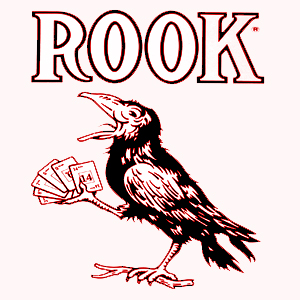07 May 2019
Rook
A rook is a piece in the strategy board game of chess. Each player starts the game with two rooks, one on each of the corner squares on their own side of the board. Formerly the piece was called the tower, marquess and rector. The informal name of "castle" is considered incorrect, or old-fashioned. It has other names in other languages, including being called a ship, chariot, and in Bulgarian it is called the cannon.
In the origins of chess itself, the game was called Chaturanga though it was not exactly the same as modern chess. The piece we call a rook was considered to be a chariot rather than a castle, probably because of the speed with which it moves. The Sanskrit word for chariot was "ratha." However as the game came to Europe the word got confused with the Italian word rocca meaning a tower.
A rook is also a Eurasian crow with black plumage and a bare face that nests in colonies in treetops. The rook's scientific name is Corvus frugilegus from Latin with Corvus meaning "raven", and frugilegus for "fruit-gathering", from earlier frux, frugis, "fruit", and legere, "to pick." The English name is derived from the bird's harsh call.
As a verb, rook can mean to defraud, overcharge, or swindle someone. A bad deal, or a rip-off is sometimes called a rook. The origin of this usage is not clear at all.
Rookeries are bird nesting or breeding places and the word was later used to describe overcrowded or dilapidated tenement housing or other group of rundown dwellings. It is possible that this later usage led to the idea of "getting rooked" coming from the idea of people living in these conditions either being swindled or overcharged, or that they were the type of people who would swindle others.
Interestingly, another bird connection is the verb to fleece which also means to swindle. A victim of being fleeced can be considered a "pigeon" and the people who prey on these pigeons are called rooks and both groups may well live in one of those rookeries.
Young rookies, whether birds or people, are novices without training, who are more likely to be tricked, duped, fleeced or rooked.
In Britain, a rook is also a type of firecracker that is used by farmers to scare birds of the same name.
Rook is also a trick-taking card game, usually played with a specialized deck of cards. Play of a hand centers on a series of finite rounds or units of play, called tricks, which are each evaluated to determine a winner or taker of that trick.
The cards for this game are sometimes called Christian or missionary cards. The card decks were introduced by Parker Brothers in 1906 to provide an alternative to standard playing cards for Puritan or Mennonite members who considered the standard face cards inappropriate. That's because playing cards were associated with gambling and fortune-telling.
Subscribe to:
Post Comments (Atom)





No comments:
Post a Comment
All comments need to be approved by the admins. Spam will be deleted.